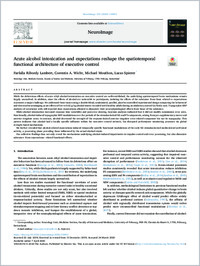Acute alcohol intoxication and expectations reshape the spatiotemporal functional architecture of executive control
- Ribordy Lambert, Farfalla Neurology Unit, Medicine Section, Faculty of Science and Medicine, University of Fribourg, 1700, Fribourg, Switzerland
- Wicht, Corentin Aurèle Neurology Unit, Medicine Section, Faculty of Science and Medicine, University of Fribourg, 1700, Fribourg, Switzerland
- Mouthon, Michaël Neurology Unit, Medicine Section, Faculty of Science and Medicine, University of Fribourg, 1700, Fribourg, Switzerland
- Spierer, Lucas Neurology Unit, Medicine Section, Faculty of Science and Medicine, University of Fribourg, 1700, Fribourg, Switzerland
-
15.07.2020
Published in:
- NeuroImage. - 2020, vol. 215, p. 116811
English
While the deleterious effects of acute ethyl alcohol intoxication on executive control are well-established, the underlying spatiotemporal brain mechanisms remain largely unresolved. In addition, since the effects of alcohol are noticeable to participants, isolating the effects of the substance from those related to expectations represents a major challenge. We addressed these issues using a double-blind, randomized, parallel, placebo-controlled experimental design comparing the behavioral and electrical neuroimaging acute effects of 0.6 vs 0.02 g/kg alcohol intake recorded in 65 healthy adults during an inhibitory control Go/NoGo task. Topographic ERP analyses of covariance with self-reported dose expectations allowed to dissociate their neurophysiological effects from those of the substance.While alcohol intoxication increased response time variability and post-error slowing, bayesian analyses indicated that it did not modify commission error rates. Functionally, alcohol induced topographic ERP modulations over the periods of the stimulus-locked N2 and P3 components, arising from pre-supplementary motor and anterior cingulate areas. In contrast, alcohol decreased the strength of the response-locked anterior cingulate error-related component but not its topography. This pattern indicates that alcohol had a locally specific influence within the executive control network, but disrupted performance monitoring processes via global strength-based mechanisms.We further revealed that alcohol-related expectations induced temporally specific functional modulations of the early N2 stimulus-locked medio-lateral prefrontal activity, a processing phase preceding those influenced by the actual alcohol intake.Our collective findings thus not only reveal the mechanisms underlying alcohol-induced impairments in impulse control and error processing, but also dissociate substance- from expectations- related functional effects.
- Faculty
- Faculté des sciences et de médecine
- Department
- Médecine 3ème année
- Language
-
- English
- Classification
- Biological sciences
- License
-
License undefined
- Identifiers
-
- RERO DOC 328653
- DOI 10.1016/j.neuroimage.2020.116811
- Persistent URL
- https://folia.unifr.ch/unifr/documents/308797
Statistics
Document views: 131
File downloads:
- pdf: 242
